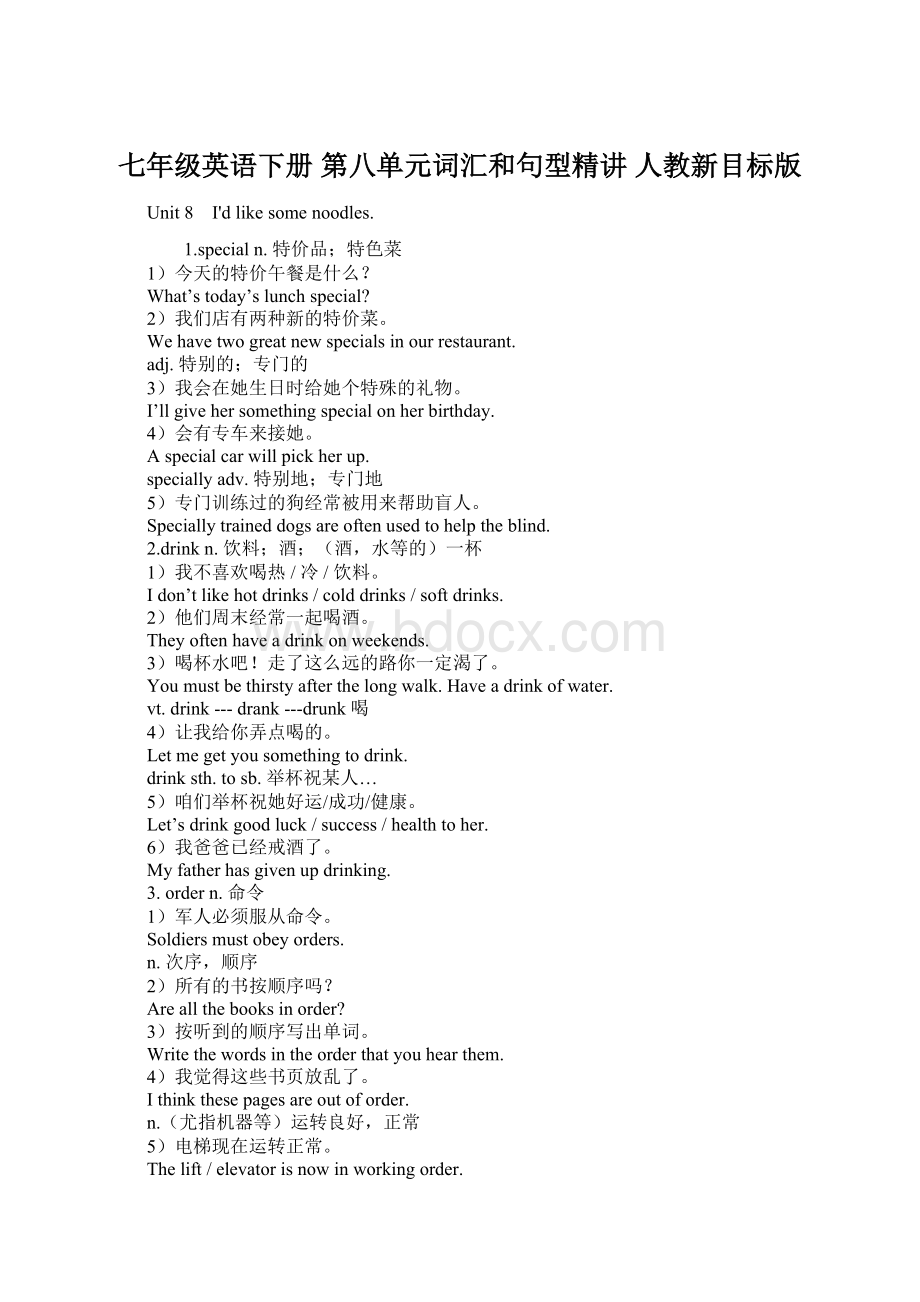七年级英语下册 第八单元词汇和句型精讲 人教新目标版文档格式.docx
《七年级英语下册 第八单元词汇和句型精讲 人教新目标版文档格式.docx》由会员分享,可在线阅读,更多相关《七年级英语下册 第八单元词汇和句型精讲 人教新目标版文档格式.docx(11页珍藏版)》请在冰豆网上搜索。

Myfatherhasgivenupdrinking.
3.ordern.命令
1)军人必须服从命令。
Soldiersmustobeyorders.
n.次序,顺序
2)所有的书按顺序吗?
Areallthebooksinorder?
3)按听到的顺序写出单词。
Writethewordsintheorderthatyouhearthem.
4)我觉得这些书页放乱了。
Ithinkthesepagesareoutoforder.
n.(尤指机器等)运转良好,正常
5)电梯现在运转正常。
Thelift/elevatorisnowinworkingorder.
6)投币电话出故障了。
Thepayphoneisoutoforder.
n.点餐;
订货
7)你现在可以点餐了吗?
MayItakeyourordernow?
8)我们要订购一台新洗衣机。
We’llplaceanorderforanewwashingmachine.
9)请填写订货/点菜单。
Pleasefillintheorderform.
vt.命令;
吩/嘱咐
ordersb(not)todo.命令/吩咐某人(不)做
10)他命令他的部下立刻出发。
Heorderedhismentostartatonce.
11)医生嘱咐他不要再吸烟了。
Thedoctororderedhimnottosmokeanymore.
12)他命令我们立刻离开。
(虚拟语气)
Heordered(that)we(should)leaveatonce.
inorder(not)todosth.以便…(不)能,为了(不)做…
13)为了能按时到那里,你可以搭爸爸的车。
Inordertogetthereontime,youcangetaridefromyourfather.
14)植物要生存得需要水。
Plantsneedwaterinordertolive.
15)为了不错过班车,她今天早上起得很早。
Inordernottomissthebus,shegotupearlythismorning.
vt.ordersth.点餐;
16)你准备好点餐了吗?
Areyoureadytoorderyourdinner?
17)他们已经为你生日订了一个蛋糕。
They'
veorderedacakeforyourbirthday.
vt.把…呼来唤去
18)我希望她停止对我呼来唤去。
Ihopeshewillstoporderingmearound.
语法:
名词复数的变化规律
一、名词复数的构成方法及读音规则
1.一般情况加–s:
清辅音后读/s/。
例如:
map—maps;
drink—drinks;
roof—roofs;
park—parks;
元音后读/z。
boy—boys;
show—shows;
zoo—zoos;
panda—pandas;
car—cars;
singer—singers;
浊辅音后读/z/。
girl—girls;
pen—pens;
friend—friends;
bag—bags;
lab—labs;
room—rooms;
2.以s,sh,ch,x等结尾加–es,读/iz/。
如:
bus—buseswatch—watches
box—boxesbrush—brushes
match—matchesfish—fishes
3.以辅音字母+y结尾,变y为i,再加es,读/z/。
baby—babies;
strawberry—strawberries
country—countries;
story—stories
family—families;
city—cities
但以y结尾的专有名词,或元音字母+y结尾的名词变复数时,直接加s变复数。
twoMarys theHenrys
monkey—monkeys;
play—plays;
holiday—holidays
4.以o结尾的名词,变复数时:
1)加s,如:
photo---photos,zoo---zoos
piano---pianos,radio---radios;
2)加es,如:
potato---potatoes,
tomato---tomatoes,
hero---heroes(英雄),
Negro---Negroes(黑人)
volcano---volcanoes(火山),
mosquito---mosquitoes(蚊子)
mango---mangoes/mangos(芒果),
5.以f或fe结尾的名词变复数时:
1)加s,如:
belief---beliefs(信仰,信任)
roof---roofs(房顶)
safe---safes(保险柜)
gulf---gulfs(海沟,海湾)
handkerchief---handkerchiefs/handkerchieves(手绢/帕)
scarf---scarfs/scarves(围巾)
2)去f,fe加ves,如:
half---halves(半)knife---knives
leaf---leaves wolf---wolves
wife---wives life---lives(生命)
thief---thievesshelf---shelves(架子)
self---selves(自己)
6.以th结尾的词,在词尾加-s。
mouth---mouths,path---paths(小路),
death---deaths(死亡的人),
month---months
二、名词复数的不规则变化
1.child---children, foot---feet,
tooth---teeth,goose---geese(鹅),
mouse---mice(小老鼠),
man---men, woman---women,
注意:
由一个词加man或woman构成的合成词,其复数形式也是-men和-women。
anEnglishman--twoEnglishmen。
但German不是合成词,所以复数形式为Germans.
2.单复同形。
deer鹿, sheep绵羊
3.集体名词,以单数形式出现,但实为复数。
people police cattle等本身就是复数,不能说apeople(一个人),apolice,acattle;
(但是可以有:
apeople:
一个民族)
但在表达“一个…”时,可以说aperson,apoliceman,aheadofcattle.
4.以s结尾,仍为单数的名词,如:
1)maths(英:
数学),politics(政治),physics(物理)等学科名词,虽然后有-s,但是为单数形式。
2)news为不可数名词。
3)theUnitedStates,theUnitedNations视为单数。
4)以复数形式出现的书名,剧名,报纸,杂志名,也可视为单数。
“TheArabianNights”isaveryinterestingstorybook.
《一千零一夜》是一本很有趣的故事书。
5.表示由两部分构成的东西,只有复数形式。
glasses;
trousers;
pants;
shorts;
shoes;
compasses(圆规)scissors(剪刀)等,若表达具体数目,要借助数量词pair(对,双);
suit(套)。
apairofglasses“一副眼镜”;
twopairsoftrousers“两条裤子”等。
6.另外还有一些名词,其复数形式有时可表示特别意思。
goods货物,waters水域,fishes(各种)鱼。
三、表示“某国人”的单复数变化:
1.单复数形式相同
Chinese---Chinese;
Japanese---Japanese:
Swiss---Swiss(瑞士人)
2.加-s的词:
German---Germans(德国人)
Russian---Russians(俄罗斯人)
Roman---Romans(罗马人)
American---Americans
Arab---Arabs(阿拉伯人)
3.有变化的词有:
Frenchman---Frenchmen;
Englishman-Englishmen
四、合成名词变为复数时:
1.第一个或最后一个词变成复数。
girlfriend---girlfriends(女朋友)
boystudent---boystudents(男学生)
grown-up---grown-ups(成年人)
passer-by---passers-by(过路人)
son-in-law---sons-in-law(女婿)
2.构成合成名词的两个词都要变为复数。
manservant---menservants(男仆人)
womanteacher---womenteachers
mandoctor---mendoctors
1.Whatkindofnoodleswouldyoulike?
(P47—1C)
你想吃哪种类型的面条?
wouldlike+sth./todosth./sb.todosth想/想要/愿意…
1)---你想喝什么?
---我想喝杯茶。
---Whatwouldyouliketodrink?
---I’dlikeacupoftea.
2)她不想那样做。
Shewouldn’tliketodothat.
3)我想让你和我一起去那里。
I’dlikeyoutogotherewithme.
wouldlike与want的区别:
wouldlike与want都有“愿意,想,想要”的意思,但用法略有不同:
A:
表示愿望时wouldlike与want意思接近,但wouldlike更加客气、更礼貌、更委婉一些。
B:
wouldlike主要用于委婉地提出请求或建议,常用于口语中。
C:
wouldlike与want两个词可以互换,但want有时态、人称变化,而wouldlike则没有。
whatkindof…询问“哪一种…”。
4)你妈妈喜欢哪种水果?
Whatkindoffruitdoesyourmotherlike?
kind名词,表示事物的种类。
akindof一种
5)竹子是一种草。
Bambooisakindofgrass.
6)这是一种蔬菜吗?
Isthisakindofvegetable?
this/thatkindof这/那一种
7)这种书在青少年中很畅销。
Thiskindofbookisverypopularamongteenagers.
allkindsof=kindsof=differentkindsof
各种各样的
8)动物园里有各种各样的动物。
Thereareallkindsofanimalsinthezoo.
9)这家服装店卖各种各样的T-恤衫。
TheclothesstoresellsdifferentkindsofT-shirts.
2.I’dlikebeefandtomatonoodles,please.(P47—1c)我想吃牛肉西红柿面。
=I’dlikenoodleswithbeefandtomatoes.
I’dlikebeefandtomatonoodles.
名词作定语修饰名词时,修饰词一般不用复数形式。
1)河边有很多苹果树。
Therearemanyappletreesneartheriver.
2)你想要两碗鸡蛋西红柿面吗?
Wouldyouliketwobowlsofeggandtomatonoodles?
3)他的叔叔在一家面条店里工作。
Hisuncleworksinanoodlehouse.=Hisuncleworksinahouseofnoodles.
4)打扰一下。
你能告诉我饺子馆在哪里吗?
Excuseme.Canyoutellmewherethedumplinghouseis?
=Excuseme.Canyoutellmewherethehouseofdumplingsis?
5)我要一大份草莓香蕉冰激凌。
I’dlikeabigstrawberryandbananaicecream.
6)学生活动调查结果是什么?
Whatistheresultofthestudentactivitysurvey?
asportsclub 体育俱乐部
sportsshoes 运动鞋
sportscollections 体育收藏品
sportsshirt (男子的)运动衣
sportsmeet/meeting运动会
sportscar跑车
sports作定语,常用复数形式,只用在名词前面。
3.Whatsizebowlofnoodleswouldyoulike?
(P48—GrammarFocus)
你想要多大碗的面条?
whatsize询问尺寸、大小,“多大尺寸,什么号码的”。
size是名词,可以表示物品的大小、尺寸、号码。
1)---你要多大号码的鞋?
---我要38码的。
---Whatsizeshoeswouldyoulike?
---I’dlikeSize38.
2)这件T恤有点小,你能给我一件大号的吗?
ThisT-shirtisalittlesmallforme.Wouldyouliketoshowmealargersize?
abowlof…”一碗…”;
冠词/数词+容器名词+of+名词
3)她晚饭只喝了一碗粥。
Sheonlyhadabowlofporridgefordinner.
4)那个男孩午饭吃了两碗米饭。
Theboyhadtwobowlsofriceforlunch.
acupof/twocupsoftea一/两杯茶
abasketof/threebasketsofapples一/三篮子苹果
abagof/fourbagsofrice一/四袋子大米
aglassof/twoglassesofmilk一/两杯牛奶
4.Extendedsentences(拓展)
Waiter:
·
Welcometo…Thisway,please.
CanIhelpyou?
/WhatcanIdoforyou?
Here’sthemenu.
MayItakeyourordernow?
Waitaminute/moment,please…
Here’sthechange,please.
Customer:
I’dlikeatablefortwo/four.
MayIorder/takeanordernow?
What(kindof…/size)doyouhave?
Howmuchisthebigbowlof…?
That’stooexpensive.I’dlike…
5.Atthehouseofdumplings,wehavesomegreatspecials!
(P51—3a)
在我们的饺子馆,我们有一些特价餐!
specialadj. 形容词,“特殊的,特别的,专门的”;
此处作为名词,表示“特价商品,特别节目,特刊等”。
1)他是我一个特殊的朋友。
(形容词)
Heisaspecialfriendofmine.
2)今天的报纸上没有什么特殊的东西。
There’snothingspecialintoday’snewspaper. (形容词)
3)他们将坐专列从上海来北京。
TheywilltakeaspecialtrainfromShanghaitoBeijing.(形容词)
4)今天你们餐馆的特价菜是什么?
(名词)
Whatistoday’sspecialinyourrestaurant?
5)昨天我在回家的路上买了一本体育特刊。
Iboughtasportsspecialonmywayhomeyesterday.(名词)
6.Special1hasbeefandonion,andisjust10RMBfor15dumplings.(P51—3a)
1号特价餐有牛肉和洋葱,15个饺子只需10元。
for有时可以代替好多动词,在此译成“买到”。
1)他没有钱打出租车。
Hedidn’thaveanymoneyforataxi.
2)我昨天得回家吃午饭。
Ihadtogohomeforlunchyesterday.
3)今天早上她把作业落在家里了,她得回家取。
Sheleftherhomeworkathomethismorningandshehadtogohomeforit.
7.中考链接
1)---ShallwestayathomewatchingTVtonight?
---No.I’dlike_____andseeafilm.
A.togo
B.go
C.went
D.going
[答疑编号500201090301]
『正确答案』A
2)---Whatwouldyouliketodrink?
---Itdoesn’tmatter.____willdo.
A.Nothing
B.Everything
C.Something
D.Anything
[答疑编号500201090302]
3)---Whatahotday!
Haveyouhadadrink?
---Yes.I’dliketohave___afterwork.
A.it
B.one
C.other
D.another
[答疑编号500201090303]
4)---Wouldyoulikeoneofthemooncakes?
---______.
A.Yes,p